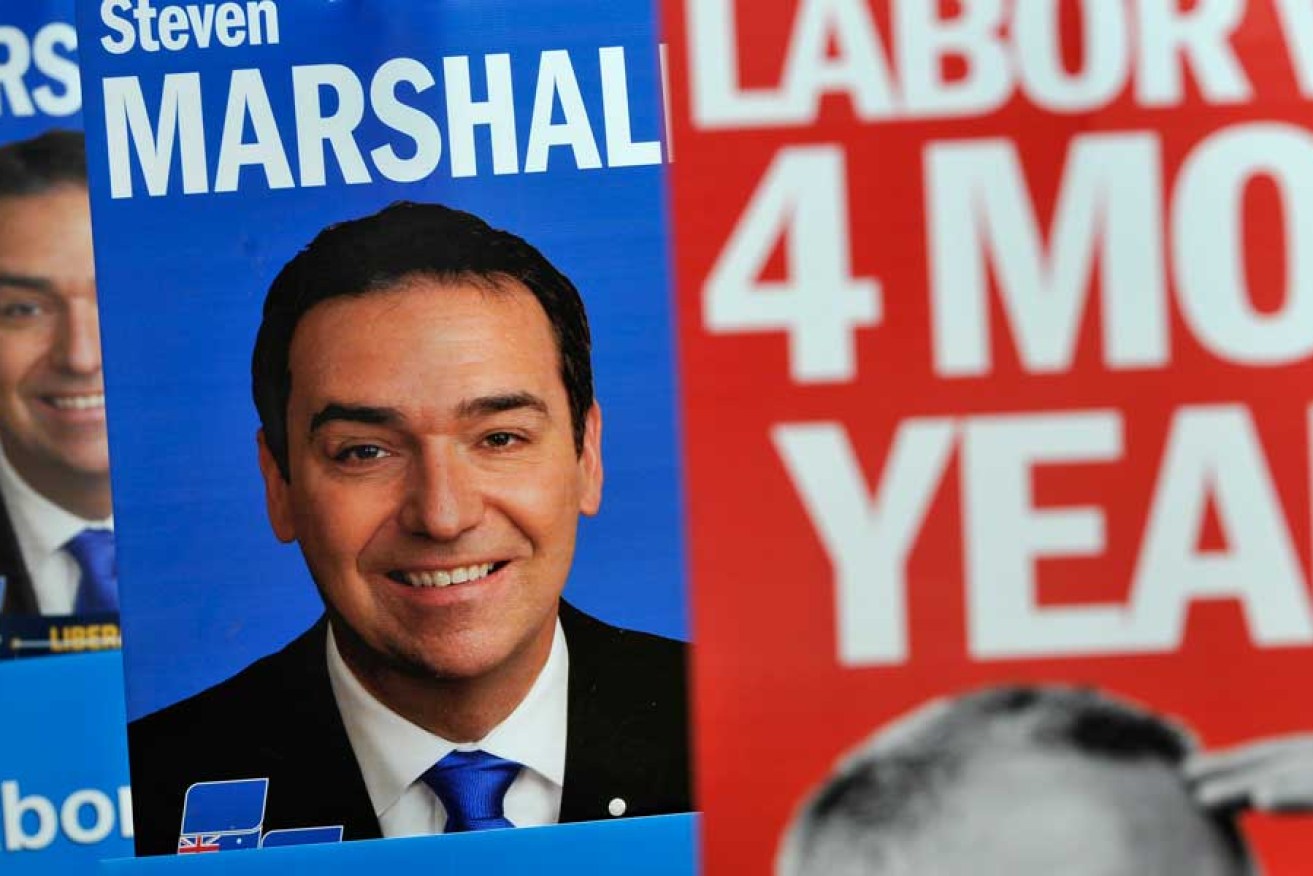Liberals chastened; Greens need rethink

Election posters outside the East Adelaide Primary School polling booth in Steven Marshall's seat of Dunstan on Saturday.
Many federal Liberals had the chickens well and truly counted ahead of Saturday’s two elections. Now they’re reliving at one remove their own 2010 nightmare, as last votes are tallied and crossbenchers courted in South Australia.
Final judgement on federal fallout will depend on who ultimately governs, but Labor has already been able to gloat that this wasn’t the anticipated disaster. The Liberals are wailing at the injustice of an electoral system that has twice delivered them a clear majority of the two-party vote, accompanied by a loss last time that may be repeated.
Prime Minister Tony Abbott on Sunday suggested SA voters would feel “cheated” if the two independents (one a defector from the Liberals) didn’t respect the strong Liberal vote.
Independents in this situation are skittish creatures and Abbott doesn’t have a great record of dealing successfully with the species, so probably he’d be best to leave it to the locals.
It’s true the Liberals have suffered because of the boundaries, but they should have campaigned much better in the key marginals, as SA Liberal senator Simon Birmingham publicly acknowledged.
The SA surprise comes as federally a Nielsen poll in Monday’s Fairfax papers shows a 2.5% swing against the Abbott government since the election. While the Coalition leads 51% (down a point since February) to Labor’s 49% (up 1 point), the closeness suggests very mixed feelings in the electorate.
Labor’s primary vote is 35%, up 2 points in a month; the Coalition is steady on 44% and the Greens unchanged on 12%. Clive Palmer’s PUP is polling 4%.
Tony Abbott’s approval remains on 45%; his disapproval is up 2 points to 49%. Opposition leader Bill Shorten’s approval has risen 2 points to 42%; his disapproval is also up 2 to 42%. Abbott leads as preferred PM 48% (down a point) to Shorten’s 43% (up 4 points).
Analysing polls forensically at this stage of the cycle has an air of unreality but they rivet the players. This one suggests both that people are equivocal about the government and Abbott, and that Shorten has a lot of work to do on the ALP primary vote.
On Medicare, the poll found more than half (52%) supported the introduction of a means test that would see only some patients eligible to be bulk billed (46% opposed). Nearly half (49%) backed a $6 payment for visiting the doctor (49% opposed). Half agreed the federal government needs to reduce the cost of Medicare; 43% disagreed.
Health Minister Peter Dutton has been on a softening up campaign for reform though what might be done is another matter. The Nielsen poll suggests that, in theory, there is scope to sell reasonable savings measures.
In practice it is always challenging to cut or say no.
Labor claimed that Abbott’s refusal to try to keep Holden and the general jobs issue were factors in the SA result; the ALP also campaigned on the spectre of what’s to come from the federal government.
“I think that the South Australian surprise result shows there is an undercurrent of concern, that South Australian voters do not trust Tony Abbott, and I think Tony Abbott has cost the South Australians an outcome which they might have otherwise got in terms of a Liberal government,” Shorten said.
Though the ALP was much heartened by SA, Tasmania was at the worse end of the expected rout.
One might expect an “it’s time” change when a government has been in 16 years but the big plunges in the votes of both Labor and the Greens were also a reaction to the ALP-Green coalition (that a desperate Labor party ditched close to the election).
Tasmania is the Greens heartland and the bad result follows their vote going backwards at the federal election.
It’s a paradox that when the Greens get a share of power, through coalition or alliance, it costs them.
The Greens are now generally on the back foot, widely seen as too hardline and uncompromising. These days Labor falls over itself to keep a distance.
The vote trend suggests it is time for the Greens to do some fundamental thinking about their future.
Their battle in the West Australian Senate election has become a huge test. If senator Scott Ludlam loses there will be more pressure on leader Christine Milne, whose position could be vulnerable before the next federal election, with deputy Adam Bandt or Victorian senator Richard Di Natale mentioned as possible replacements.
Another loser out of the Tasmania election was Clive Palmer, whose predictions of several seats came to nothing. If he can’t score one in the WA Senate contest, there will be speculation that his electoral bubble has burst – just as his considerable power in the Senate is about to begin. It would be another of those paradoxes.
Michelle Grattan is Professorial Fellow at the University of Canberra.
This article was first published at The Conversation.




